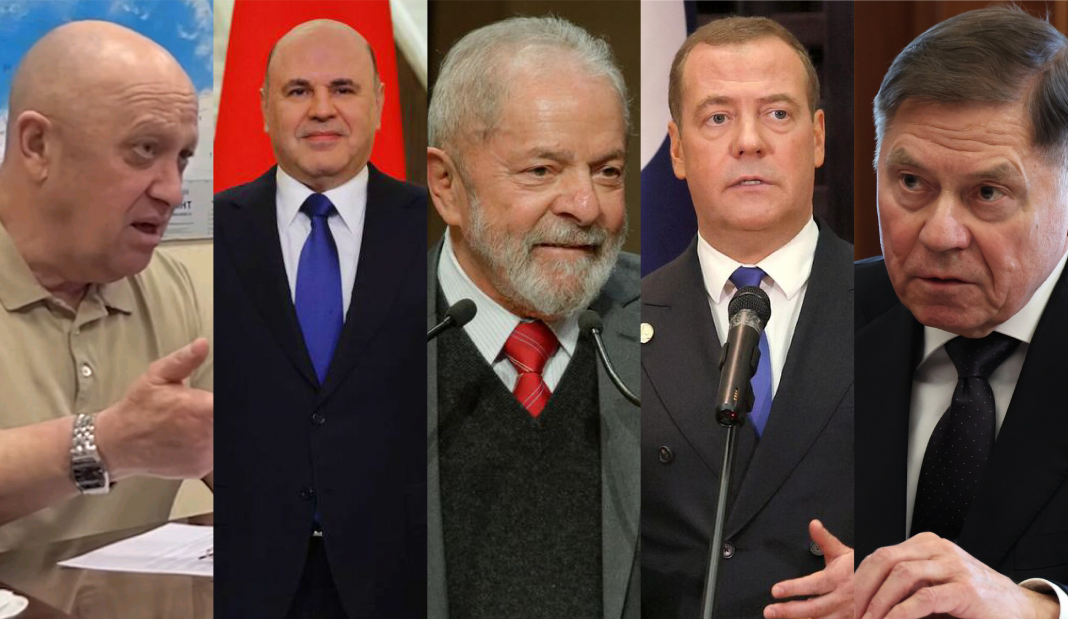This report describes the key events that significantly impacted Russia’s political, economic and social processes.
Based on the results of the past week, the following trends can be summarised:
- Moscow demonstrates consistent development of economic relations at the regional level. The EAEU summit showed that some Central Asian states are ready to build strong ties with Russia and China. Economic prospects are the connecting link of such relations. Similarly, the parties demonstrate their readiness to resolve regional conflicts and local problems. It is noteworthy that in other formats (SCO, BRICS, etc.), several African, Middle Eastern and even Latin American states are ready to join this axis. It is important to note that in the public arena, Moscow is trying in every possible way to demonstrate equal positions with China and not to play number two.
- There is an increase in negotiations at the Moscow-Beijing-Washington level, including on the Ukrainian issue. In this situation, we are not discussing an early agreement and cessation of hostilities, but we can say that possible points of contact have already been outlined. At the same time, Moscow is increasingly trying to demonstrate the “minority” of the so-called “SMO”. As a result, economic and domestic political issues are increasingly coming to the fore, behind which lies a severe crisis of the power bloc (constant changes in the goals of the so-called “SMO” indicate the impossibility of achieving them).
- Putin is increasingly playing the role of leader of the “Party of Peace” as he prepares for the upcoming presidential elections. An attempt to focus on social issues and the development of economic relations with regional partners almost completely ousted references to the situation in Ukraine from his public statements (at the same time, this is also due to the lack of any result on the battlefield). He increasingly holds meetings with representatives of various ethnic, social and religious groups living in Russia, presents them with all kinds of prizes and awards, demonstrates an interest in environmental issues, and builds relationships with Patriarch Kirill. At the same time, in contrast to the “peacekeeping” image of Putin, the figure of Yevgeny Prigozhin as the leader of the “party of war” is being increasingly promoted.
This digest describes the issues, being the most relevant for Russia from 22 to 28 May:
1. Vladimir Putin’s meeting with Chairman of the Supreme Court of the Russian Federation Vyacheslav Lebedev.
2. Events in the Belgorod region.
3. Vladimir Putin’s meeting with the Chairman of the Constitutional Court of the Russian Federation, Valery Zorkin.
4. EAEU summit in Moscow.
5. Vladimir Putin’s meeting with Azerbaijani President Ilham Aliyev and Armenian Prime Minister Nikol Pashinyan
6. Telephone conversation between Vladimir Putin and Brazilian President Luiz Inacio Lula da Silva.
7. Dmitry Medvedev’s visit to Vietnam.
8. Mikhail Mishustin’s visit to China.
9. Appointment of Maxim Travnikov.
10. Deployment of Russian nuclear weapons in Belarus.
11. Interview with Yevgeny Prigozhin
12. Visit of China’s Special Representative for Eurasian Affairs in Moscow.
13. Vladimir Kolokoltsev’s visit to Saudi Arabia.
This Content Is Only For Subscribers
- Vladimir Putin’s meeting with Chairman of the Supreme Court of the Russian Federation Vyacheslav Lebedev
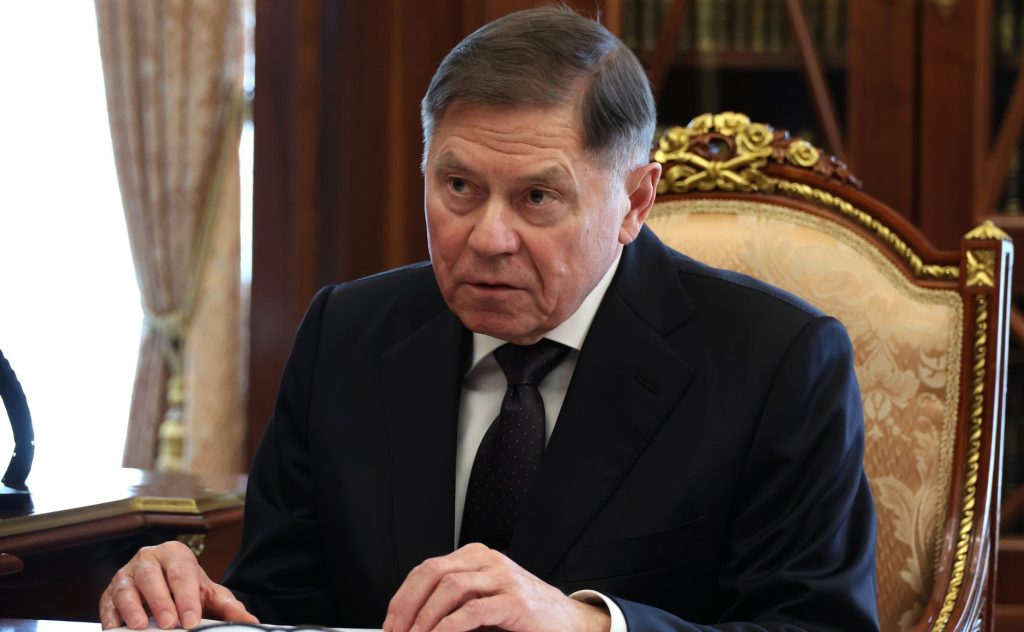
On Monday, May 22, Vladimir Putin had a working meeting with the Chairman of the Supreme Court, Vyacheslav Lebedev. According to official data, during the meeting, they discussed measures aimed at humanising law enforcement practice and working on creating courts in the temporarily occupied territories of Ukraine.
Key theses:
- Lebedev: “We have prepared an appropriate draft law aimed at humanising law enforcement practice against women, against persons who have committed crimes of small and medium gravity for the first time. The ultimate goal of this draft law is that a person, if he were brought for the first time for these offences, would not be held criminally liable at all, so there would first be administrative or other disciplinary responsibility. And only in the case of repeated commission of these actions can criminal liability arise.
- Lebedev: “As for bringing women to criminal responsibility, we propose the following structure: so that for crimes of minor gravity, even in situations where a woman is without a residence permit, without registration, she will still not be held criminally liable.”
- Lebedev: “Following the legislation that came into force, the competition announced for the positions of heads of the courts of the [self-proclaimed] LDNR, [temporarily occupied territories] of Zaporizhzhia and Kherson regions has already ended. I believe that somewhere by the fall, we will form a judiciary, and the plenum of the Supreme Court of the Russian Federation in the new subjects of the Federation will announce the start of the work of the courts.
Outcomes and outlook:
In Russia, the forced integration of the “new territories” continues, up to strengthening the judicial vertical and extending it to the [temporarily occupied] Donetsk, Luhansk, Zaporizhzhia and Kherson regions. Such “integration” processes indicate that Moscow does not plan to abandon its plans for these territories and is trying to “legalise” its presence, including through the development of the judicial branch of power. For the internal system, this is a more significant step. Moreover, considering that the 2020 amendments to the Constitution of the Russian Federation introduced its immediate priority over international legislation, international treaties and decisions of international bodies, the formation of the judiciary in the temporarily occupied territories of Ukraine demonstrates the “democratisation” of processes.
Such an approach entirely fits into the Kremlin’s strategy, which has been promoted recently. He can find support among Russia’s partner states as well.
At the same time, such a decision does not carry a special semantic load for the West and Ukraine. As a result, demonstration of the “democratisation” of processes is unlikely to receive any reaction, nor will it have noticeable consequences.
Putin also demonstrates readiness for situational humanisation of legislation for the domestic consumer – new norms are introduced that are frankly populist. All this is happening in the logic of the events of the pre-election year – Putin is trying to flirt with the female audience, as well as the younger generation, who support the liberalisation of political processes in the country.
- Events in the Belgorod region
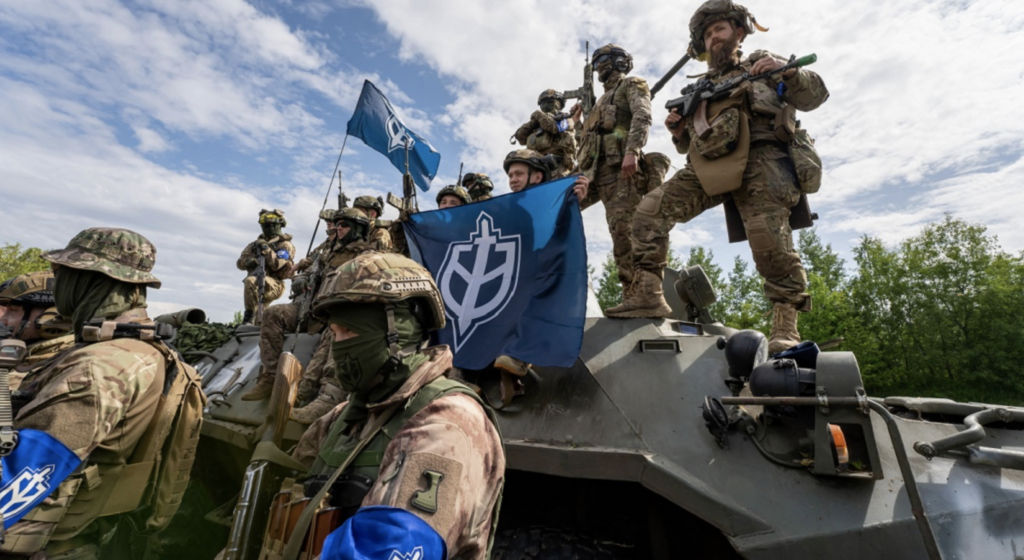
On Monday, May 22, the network began to disseminate information about the beginning of the offensive of units from among the Russians fighting for Ukraine on the territory of the Belgorod region. Later, on the official pages of the Russian Volunteer Corps and the Freedom of Russia Legion, posts called on Russian border settlement residents to “stay at home and not resist.” Later, information appeared about a border checkpoint in Graivoron (Belgorod region) and a video where a Ukrainian tank was allegedly driving over it.
Timeline:
- A few Russian Telegram channels have begun to report that a battle is underway near the village of Dronovka in the Russian Federation with a sabotage group of the Armed Forces of Ukraine that has penetrated there. At the same time, many Telegram channels stated that this was a fake.
- Governor of the Belgorod Region Vyacheslav Gladkov reported on a missile attack on the Graivoronsky District and the work of air defence and damage from the debris from downed missiles. He also stated that a massive information attack is underway on the region.
- The Legion of Freedom of Russia and the Russian Volunteer Corps claimed to have taken control of the village of Kozinka in the Belgorod Region of the Russian Federation (Grayvoronsky District).
- Vyacheslav Gladkov confirmed information about the situation in the region: “A sabotage and reconnaissance group of the Armed Forces of Ukraine entered the territory of the Graivoron district. The armed forces of the Russian Federation, together with the border service, the National Guard and the FSB, are taking the necessary measures to eliminate the enemy. I will provide details.” Gladkov also announced a counter-terrorist operation in the Belgorod region.
- Russian Telegram channels began to disseminate information, according to which Ukrainian armoured vehicles entered the Grayvoron checkpoint, consisting of a T-72 tank, two HMMWV units, a Cougar and a KrAZ.
- Andriy Yusov, spokesman for the Main Intelligence Directorate of the Ministry of Defense of Ukraine, said that the Legion of Freedom of Russia and the Russian Volunteer Corps are conducting an operation on the territory of the Belgorod region to build a “security line to protect the citizens of Ukraine.”
- Sometime later, Putin’s spokesman Dmitry Peskov said that the Kremlin already knew about the breakthrough of the “Ukrainian DRG” into the territory of the Belgorod region: “Work is underway to squeeze them out of Russian territory and destroy this sabotage group. There are enough forces and resources in place. We perfectly understand the purpose of such sabotage – to divert attention from the Bakhmut direction, to minimise the political effect of the loss of Artemovsk by the Ukrainian side.”
- Vyacheslav Gladkov stated that during the shelling of the administration building of the city of Graivoron, the deputy head of the city’s mayor was wounded, and two men and a woman were also injured. In addition, two employees of the Ministry of Emergency Situations were also wounded.
- The Office of the President of Ukraine stated that they “have no direct relation” to what is happening in the Belgorod region: “The only driving political force in a totalitarian country of tightened screws always inevitably becomes a partisan movement with weapons in their hands … As you know, tanks are sold in any Russian military trade, and the underground partisan detachments still consist of Russian citizens.
- At the same time, balloons with a white-blue-white flag of the “Legion of Freedom of Russia” attached to them were launched in Moscow.
- On Tuesday, May 23, Vyacheslav Gladkov announced that a “counter-terrorist operation” is continuing in the Belgorod Region. He said, “The territory is being cleaned up by the Ministry of Defense together with law enforcement agencies.”
- The Ministry of Defense of the Russian Federation made the first public statement on the situation in the Belgorod Region: “In the course of the counter-terrorist operation, air strikes, artillery fire and active actions of the units covering the State Border of the Western Military District nationalist formations were blocked and defeated. The remnants of the “nationalists” were driven back to the territory of Ukraine, where they continued to be hit by fire until they were eliminated. Over 70 Ukrainian terrorists, four armoured fighting vehicles and five pickups have been destroyed.”
- In the late afternoon, information began to appear about the repeated entry of armed groups into the territory of the Russian Federation. Later, this information was denied by the governor of the Belgorod region, and he also announced the end of the counter-terrorist operation.
- Spokesman for the UN Secretary-General, Stephane Dujarric, said that “Reports about what is happening in the Belgorod region are cause for concern.” However, he also urged to refrain from further escalation.
- The Times published an article stating that “the cross-border operation in the Belgorod region of the Russian Federation bears the hallmarks of an operation by the GUR of Ukraine.” The publication notes that “the people who carried out the raid were Russians, but dressed in Ukrainian camouflage, armed with NATO-standard rifles and American Hummers.”
- The Pentagon said that the United States did not approve the transfer of equipment delivered to Ukraine to a third party, and Kyiv did not request this. However, the department also noted that the United States is closely monitoring reports that the “Ukrainian DRG” that penetrated the Belgorod region used American equipment.
- The Financial Times published an article, the author of which claims that he spoke with the leader of the Russian Volunteer Corps, Denis Nikitin, who, in particular, reported that at least two M1224 MaxxPro armoured vehicles and several Humvees did participate in the raid. However, he refused to say where they got them from.
- At the same time, US State Department spokesman Matthew Miller said during a briefing that his department is sceptical about reports of the use of American weapons in the Belgorod region of Russia.
- Videos have begun circulating online, in which Colonel-General Alexander Lapin, Chief of the Russian Ground Forces General Staff, allegedly leads a counter-terrorist operation in the Belgorod Region.
- The New York Times published an article stating that Ukrainian servicemen did not cross the border with Russia. At the same time, they covered the participants in the raid and played a “supporting role.”
- On Tuesday, May 24, BBC correspondent Frank Gardner said the saboteur attack on the Belgorod region was “a dubious success for Ukraine”: misfortune.”
- Vyacheslav Gladkov said that a “large number” of drones attacked the Belgorod region at night: “A gas pipeline is on fire in the region, there is no light in places, and nine victims are in hospitals.” Damage was recorded in Belgorod itself. There was also footage of a UAV hitting the FSB building in the city.
- The “Russian Volunteer Corps” and “Legion Freedom of Russia” gave a press conference on the results of their raid in the Belgorod region. The Legion reported that their two fighters were killed and ten were injured during the operation. In the “Russian Volunteer Corps”, he reported two wounded and denied the statements of the Russian Ministry of Defense about his “defeat”. Both organisations also stated that they plan to return to the territory of the Russian Federation to perform new tasks.
Outcomes and outlook:
Obviously, “proxy groups” associated with Ukraine and formed along ethnic lines took part in the campaign against the Belgorod region (in this case, the detachments consisted of citizens of the Russian Federation fighting on the side of Ukraine). This is not a new phenomenon, especially since these same groups raided the Bryansk region a little earlier. However, this raid revealed the weaknesses of the Russian military machine. Firstly, Russia is not ready for hostilities on its territory – the arrival of two small groups led the Armed Forces of the Russian Federation into a state of confusion.
Secondly, Russia has weak rears and weak capabilities to protect them. Thirdly, Russia turned out to be unprepared for the correct information response to the situation – that is, the whole system is too cumbersome and clumsy. Finally, the actions of the servicemen (especially the odious General Lapin) seem generally feigned and staged, far from understanding the effectiveness. Thus, the raid of “proxy groups” revealed many interesting points, which, no doubt, will be used by the Armed Forces of Ukraine in the future. It is also “food for thought” for the Western military departments – one action showed many weaknesses in the Russian army. In Russia, there should be a reaction to what happened since the Belgorod region is not a unique case but a verdict on a system based on window dressing.
At the same time, such actions also demonstrate many potential threats to Kyiv. In particular, the ambiguous reaction of the West has shown that there is currently no consensus on the conduct of hostilities on Russian territory. Moreover, publications in several Western media indicate that such use of NATO weapons and equipment supplied to Ukraine raises concerns among several states. Notably, the materials focus specifically on American technology, which should also be considered a provocation.
Moreover, the ambiguous reaction of the West caused a corresponding uncertainty among the Ukrainian authorities. The initial statements by representatives of the Main Intelligence Directorate of the Ministry of Defense of Ukraine about assisting the Legion of Freedom of Russia and the Russian Volunteer Corps were discordant with the statements of the Office of the President about Ukraine’s non-involvement in the actions of these organisations.
In fact, as a result of such actions, Putin’s propaganda gets the opportunity to justify its claims that on the territory of Ukraine, for many years, militant groups have been preparing to carry out “terrorist acts” inside Russia. This thesis will soon be widely disseminated in the Russian media.
At the same time, a video released by the Russian Volunteer Corps shows 38-year-old Alexei Levkin, a well-known figure among far-right organisations in the post-Soviet space. Earlier, Bellingcat published more details about Levkin, indicating that he was part of a neo-Nazi group involved in vandalising Jewish and Muslim graves, several attacks, and at least four murders. Since 2014, Levkin has been in Ukraine. He fought in the Donbas as part of Azov. In 2016, he co-founded the neo-Nazi structure Wotanjugend, which was described as a network “mini-university for supporters of right-wing ideology”, proclaiming “heroes” of such ultra-right terrorists as Timothy McVeigh and Anders Breivik.
Such information can also become a reason for a very ambiguous reaction in the West, which has already manifested itself in UN statements. At the same time, the main risk remains the activation of Russian propaganda since the raid itself demonstrated that Russia could not offer practical actions to protect its own borders.
- Vladimir Putin’s meeting with the Chairman of the Constitutional Court of the Russian Federation, Valery Zorkin
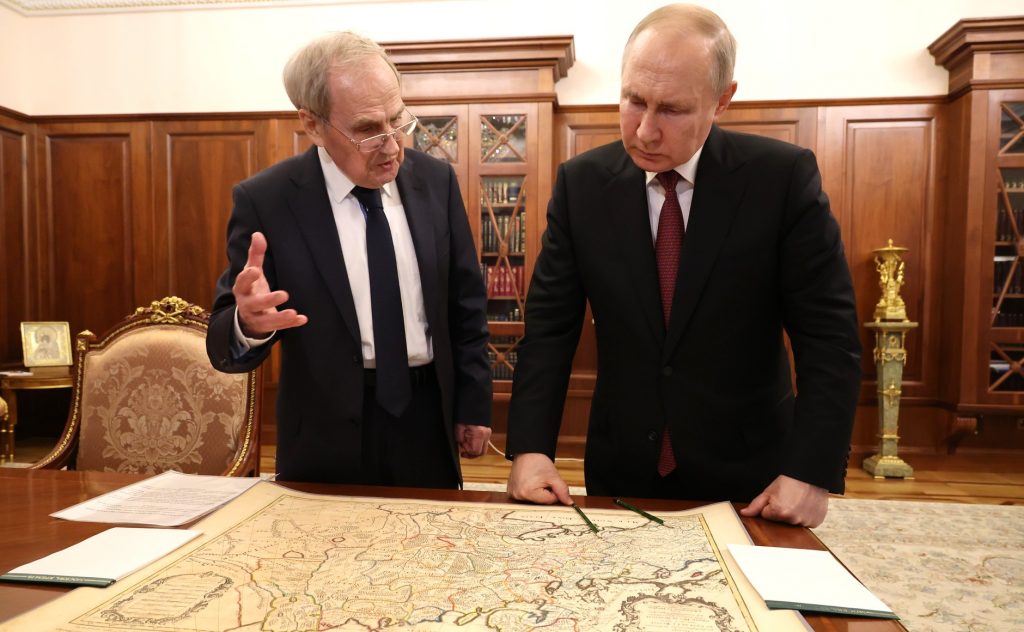
On Tuesday, May 23, Vladimir Putin had a meeting with Chairman of the Constitutional Court, Valery Zorkin. Apparently, the meeting did not have a special meaning in terms of jurisprudence or possible constitutional changes. Moreover, Putin and Zorkin had already met the day before, during the presentation of state awards. At the same time, the most memorable moment of the meeting was the discussion of the map of the 17th century and another “excursion into history” from Putin.
Key theses:
- Zorkin: “Remember, when Russia withdrew from Strasbourg [ECtHR], and a little earlier, amendments to the Constitution were adopted, and the procedure for access to the Constitutional Court was complicated – this required going through all instances, including the Supreme Court, unlike the previous procedure, when it was possible to apply directly from Magadan to the Constitutional Court. There were many criticisms: access is now closed, it has worsened, and so on. Here are the statistics, please: in 2019, 2020, 2021, and 2022, I don’t know how in 2023, approximately, according to estimates, it will be the same [number of hits]. In this sense, there has been no “closure” [of access] to the Constitutional Court.”
- Zorkin: “At the very last place are complaints about political rights and so on. It would seem that they foreshadowed that in connection with this or that situation in the country, all this will creep, but apparently, we give an objective cut – people are more concerned about the rights I spoke about.
- Zorkin: “Taking the opportunity, it turned out that we in the Constitutional Court found a copy of the map of the 17th century, compiled under Louis XIV, that is, this is the middle, even the beginning of the second middle of the 17th century, compiled by the French themselves. Why did I bring her? Vladimir Vladimirovich, there is no Ukraine there. No Ukraine. There is a region in two places – the area of the Commonwealth and the region of Cossackia. And the great kingdom of Russia. Why did I take the risk of showing you [the map]? Because there was a lot of speculation about where the origins are, where, how and what was formed.
- Putin: “Well, we know that these lands were simply part of the Commonwealth, and then asked to be part of the Moscow kingdom, that’s all, and ended up as part of the Moscow kingdom. And only then, after the October Revolution, all sorts of quasi-state formations began to form, and the Soviet government created Soviet Ukraine. This is well known to everyone. Before that, there was no Ukraine in the history of humanity.”
Outcomes and outlook:
Putin continues to demonstrate a superficial attitude to history. The Bolsheviks invented Putin’s traditional scheme, “Ukraine”, which constantly needs to be fed. This was especially evident in the article “On the historical unity of Russians and Ukrainians”, written in July 2021.
In addition, in the case of the French map, both Putin and Zorkin demonstrate frank inattention: on the map of Guillaume Sanson, there is the ethnonym “Ukraine” about the Volyn lands. It is designated “Ukraine pays des cosaques” or “Ukraine, land of the Cossacks”. The fact that the Chairman of the Constitutional Court was instructed to voice historical nonsense shows the level of their legitimisation: most likely, the pseudo-historical scheme “there is no Ukraine and never was” will now become almost one of the pillars of state ideology.
At the same time, such rhetoric entirely fits into the Kremlin’s strategy for interaction with allies at the regional level. With the development of relations with other states of the post-Soviet space, the situation in Ukraine is presented as a conflict with a non-existent state. At the same time, repeated statements about the recognition of the borders and cultural and historical features of each of the states that were previously part of the Soviet Union are, in fact, a demonstration of a security guarantee concerning them.
- EAEU summit in Moscow
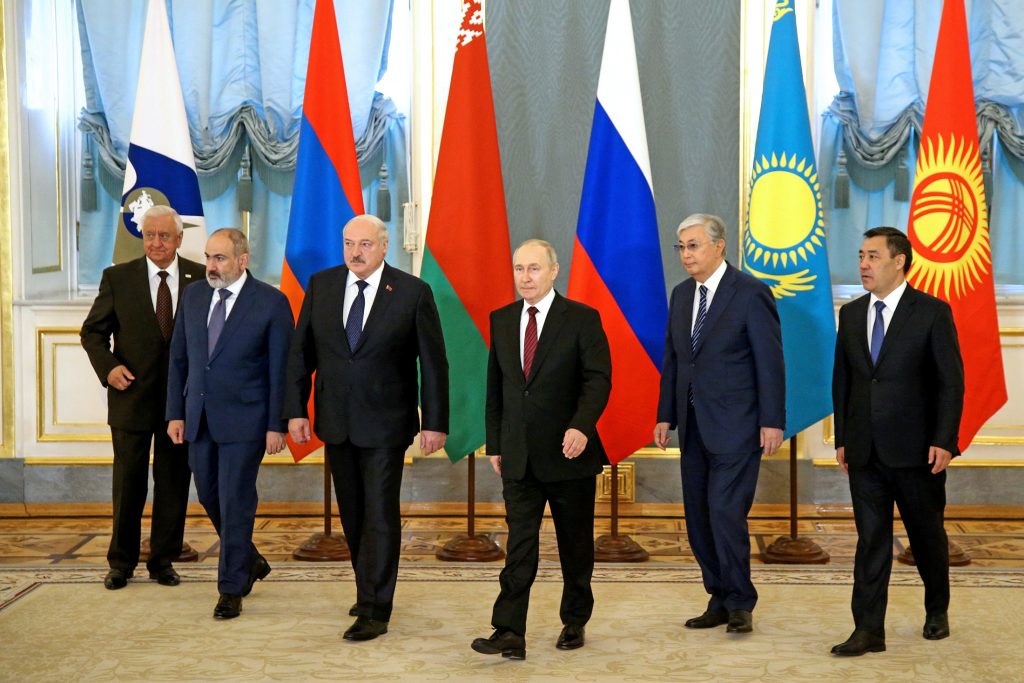
On May 24-25, the EAEU summit was held in Moscow. In particular, the leaders of the member states of the Eurasian Economic Union held a plenary meeting and a meeting of the Supreme Eurasian Economic Council. In addition, several additional meetings were held, during which regional security and stability issues were raised.
EAEU’s plenary session
Key theses:
The plenary session was attended by Russian President Vladimir Putin, President of Belarus Alexander Lukashenko, President of Kazakhstan Kassym-Jomart Tokayev, President of Kyrgyzstan Sadyr Japarov, Deputy Prime Minister of Armenia Mher Grigoryan, Chairman of the Board of the Eurasian Economic Commission Mikhail Myasnikovich. In addition, Chinese President Xi Jinping sent a video message to the participants and guests of the plenary session. The topic of the meeting was “Eurasian integration in a multipolar world.”
- Putin: “Such a wide composition of those present in this hall – officials, entrepreneurs, experts, representatives of public organisations from the countries of the “five” and other states – indicates that the role of our association is increasing, growing, speaks of a rapidly changing world.“
- Putin: “We see that profound, fundamental changes are taking place globally. More and more states are taking a course towards strengthening national sovereignty, pursuing an independent, independent domestic and foreign policy, adhering to their development model.”
- Putin: “Everyone who acts, thinks and does differently, damages the global economy, shoots, in fact, in the foot and in the foot of those who are still forced to obey their dictates.”
- Putin: “It’s no secret that our Western opponents are trying by persuasion, various promises, and blackmail to force many of our partners to curtail beneficial cooperation with Russia. At the same time, they do not care at all what losses this will bring to the respective states and their people. ”
- Putin: “I will especially mention the situation in the transport and logistics sector. Today the relevance of building new sustainable logistics chains and the accelerated development of international routes has increased. We attach great importance to this work both within the framework of the Eurasian Economic Community and outside it, including on the North-South corridor project. ”
- Putin: “We see one of the priorities of the Union in ensuring technological sovereignty. Our countries have sufficient scientific, human and industrial potential to produce high-quality, high-tech products that can withstand competition in global markets.”
- Lukashenko: “Our Eurasianism and the Eurasian Economic Union, the current EAEU, began in the kitchen of President Putin – it really was like that, he is present here, he will confirm it – and then the idea was good. I remember when he invited us home. The peculiarity of this moment was that Ukraine, Leonid Danilovich Kuchma, was with us then. Although I told my colleague that it is unlikely that anything will come of it due to the situation that has already then begun to take shape in our post-Soviet space and here in our region, nevertheless, as many as 28, in my opinion, documents Vladimir Vladimirovich, we developed together with Ukraine. But then Ukraine, as I thought, withdrew from this process.”
- Lukashenko: “One of the priorities for our country, and indeed for our entire Eurasian Union, is strengthening regional and transcontinental alliances. These are new centres, forces of the emerging multipolar world, ready to defend their interests and their development paths.”
- Lukashenko: “Look: Russia probably understood this before anyone else and began active contacts with African states. We are also trying to cooperate with them. Everyone rushed to Africa, and look how the West and the United States of America reacted to the movement of Russia today. The Russian Ministry of Foreign Affairs and others involved in politics know how the Americans are trying to slow down this process to prevent Russia from entering Africa.”
- Lukashenko: “Russia should not lower its head regarding the current situation. It is precisely Russia that can become a powerful locomotive both in the SCO and in the BRICS in giving dynamics to the development of these organisations and, perhaps, what progressive humanity dreams of in their future unification.”
- Lukashenko: “So, about the priorities of Belarus. The first is the development of the production of high-precision equipment equipped with modern electronic microprocessor components and software.”
- Lukashenko: “The next thing is the implementation of joint projects for producing electronic and optical products, increasing attention to the technologies for creating chips, integrated circuits, unmanned control technologies, automation and robotisation of the manufacturing industry. We are doing this with the Russian Federation.”
- Lukashenko: “Next is the production of electromechanical systems, including the development of technologies for the production of modern mechatronic and electromechanical components, robotic systems, CNC [computer numerical control] systems, as well as lithium-ion batteries – it’s clear why.”
- Lukashenko: “The third is energy security. The development and deepening of integration cooperation in the energy sector, strengthening the positions of the EAEU in the context of global energy security, remains a top priority for us.”
- Lukashenko: “The fourth is information security. The digital agenda of the union requires significant updating. First of all, this concerns the integrated information system of the union, which ensures the joint operation of state information resources and systems of the states of our union.”
- Lukashenko: “Fifth is food security, the foundation. The Eurasian region has unique opportunities to increase the production and export of food. We maintain the free circulation of products and avoid imposing restrictions on mutual deliveries of socially significant goods.”
- Lukashenko: “The sixth is environmental safety. Counter-partners in the West actively use the so-called green agenda as one of the instruments of pressure and restraint on the economic development of our countries.”
- Tokayev: “Given the rapidly changing picture of global commodity flows, it is now critical to monitor and, if possible, create new destinations throughout the region. To the East of us, one of the most striking and large-scale initiatives to build continental strategic connectivity is the One Belt, One Road project of the People’s Republic of China. As a result, the demand for trade and economic cooperation along the North-South line has also increased manifold.”
- Tokayev: “This is not only a growth point for industry, transport and the economy. These routes can radically change the level of interaction and cooperation within vast Eurasia. I am not talking about this by chance, but because it is transport and logistics that are now coming to the fore in international cooperation.”
- Tokayev: “It is extremely important to build effective cooperation with the key political partner of the Union – the People’s Republic of China. It should be noted that China is both the largest shipper and the largest customer.”
- Tokayev: “Another important aspect: in addition to the development of physical infrastructure, it is fundamentally important to pay special attention to creating a “soft” infrastructure, that is, digitalisation, simplification of customs administration and reduction of the administrative burden.”
- Tokayev: “I understand that integration is a very complex process, it is a very delicate work to bring all national interests to a common denominator, but we need to carry out this work in a coordinated manner; otherwise, as Alexander Grigorievich convincingly said, time is irrevocably moving forward, time there is very little left, we need concrete results.”
- Tokayev: “Before introducing something new, it is worth making every effort to make what we have planned work. It is important to understand that economic integration is not an end in itself; it is one of the means of developing the economies and the well-being of the peoples of the participating states.”
- Tokayev: “Besides, there is another delicate point, so to speak, the conceptual reality or specifics that we need to consider. This is the presence within the framework of the Eurasian Economic Union of the Union States represented by Belarus and Russia. The conceptual and ideological basis of this union is quite severe – it is the mutual recognition of the historical community of the Belarusian and Russian peoples, the recognition of cultural, linguistic, and religious identity, that is, the recognition of the existence of one people: one people – one state.
- Zhaparov: “An invariable priority of Kyrgyzstan in the union is to strengthen the role of the Eurasian Economic Commission and the EAEU Court in removing barriers in our association’s internal market.”
- Zhaparov: “Another important aspect is the unification of the strategic planning systems of the Member States to develop the necessary and necessary programs and projects. In this connection, in my opinion, we need to create a supranational institution for the development of the EAEU, which performs the functions of preparing, analytical support and financing of integration projects on the example of the Agency for Strategic Initiatives of the Russian Federation.”
- Xi Jinping: “Eurasia is the most populated continent with the most countries and diverse civilisations. In the face of a turbulent and rapidly changing world, which way should we choose to cooperate on this continent? Not only the well-being of the population in the region but also the fate of the whole world depends on this. China’s response to such an epochal and historical question is clear and unequivocal.”
- Xi Jinping: “This year marks the 10th anniversary of my Belt and Road Initiative. Its starting point and end goal is to open up new opportunities for joint development and pave the way for the well-being of the world’s countries.”
- Xi Jinping: “The Chinese side is sincerely interested in deepening and concretising cooperation in this direction and is ready to combine efforts and strengthen the interaction of new prospects for cooperation on the Eurasian continent.”
Meeting of the Supreme Eurasian Economic Council.
Key theses:
- Russian President Vladimir Putin, Armenian Prime Minister Nikol Pashinyan, Belarusian President Alexander Lukashenko, Kazakh President Kassym-Zhomart Tokayev, Kyrgyz President Sadyr Japarov, Azerbaijani President Ilham Aliyev and Chairman of the Board of the Eurasian Economic Commission Mikhail Myasnikovich attended the meeting of the Supreme Eurasian Economic Council. Also, the President of Uzbekistan, Shavkat Mirziyoyev, as the head of state – observer to the EAEU and the President of Tajikistan, Emomali Rahmon, took part via video link. In addition, Cuban President Miguel Diaz-Canel Bermudez sent a video message to the meeting participants.
- Putin: “It is necessary to ensure that citizens of all five countries, when they come to another state of the Union to work, study or do business, feel comfortable, like at home. This can be achieved if real, one hundred per cent freedom of movement of goods, services, finance and human capital is maintained within the Union, and if the competitive advantages of our states are combined.”
- Putin: “I will also mention that this year the Russian presidency is paying considerable attention to issues related to climate change. The Eurasian Climate and Ecology Club, whose tasks would include the implementation of joint research and development, the introduction of “green” technologies, the achievement of international recognition of Eurasian climate initiatives, the improvement of the state of water ecosystems, the conservation of biological diversity, exploration and development of subsoil, implementation of projects for the processing of waste and much more.”
- Putin: “I would also like to outline a new and, it seems, a promising area of our work: I would suggest adding to the well-known four freedoms (the movement of goods, services, finance and human capital within the framework of the Eurasian Economic Community) the fifth – the freedom of knowledge, which would be implemented on the basis of general principles and standards of education, health care and public administration”.
- Pashinyan: “Today, the need to form a collective system for ensuring food security has sharply increased. I consider it obvious that there is a need to consolidate the efforts of the EAEU countries in this direction.”
- Pashinyan: “Despite the results achieved, based on current realities, we need to quickly establish effective mechanisms for interaction with partners from third countries, which will consistently lead to the creation of conditions for the stable development of the economies of our countries.”
- Lukashenko: “On many important issues on the internal agenda of our integration, we are moving in a complicated and frankly slow way. First of all, we are talking about forming common markets for gas, oil, and oil products, implementing measures on the digital agenda, and liberalising the transport market.”
- Lukashenko: “At the same time, we must ensure equal access to existing and emerging infrastructure so that in the future there will be no unpleasant situations, as is the case with the export of timber products to the markets of third countries through the territories of member states and, as Kazakhstan says, coal “.
- Lukashenko: “Our response to sanctions pressure is to intensify cooperation between the SCO, BRICS and ASEAN, conclude new trade agreements and constructive mutually beneficial cooperation with everyone ready to be friends and work with us.”
- Tokayev: “It is important to expand sales markets for the goods of our exporters jointly. One of the key goals of the creation of the Union is to obtain the most favourable trade conditions from third countries based on a strong coordinated joint position.”
- Tokayev: “The Commission has to quickly complete the work on agreeing on a free trade zone with the United Arab Emirates, India, Egypt, Indonesia, and Israel. We should qualitatively strengthen our interaction with the SCO, ASEAN, MERCOSUR and other international organisations. I think the interest in cooperation on the part of these organisations is mutual.”
- Tokayev: “We are also ready to implement joint projects to develop deposits of ferrous and non-ferrous metals with further processing and production of finished products. Separately, I would like to note our successful cooperation in these areas with the Russian Federation.”
- Tokayev: “We welcome the intentions of the Russian Federation to form corridors in the direction of China, India, Pakistan, Iran, the Middle East and Southeast Asia.”
- Zhaparov: “We are going through a difficult time and an uncertain foreign economic environment. This is not only a time of change, but also of mutual support and complementarity, and not the creation of sectoral obstacles, especially barriers.”
- Zhaparov: “The most important direction on the way to creating favourable conditions in the framework of ensuring the four freedoms in the Union is the sphere of migration. I believe that working citizens of our countries should have easier conditions for exercising their labour rights on the territory of any of the member states of the Union.”
- Bermudez: “In this complex and problematic international environment, Cuba remains committed to building a more just world order in which the legitimate interests and development priorities of the countries of the South prevail.”
- Bermudez: “As an observer member of the Eurasian Economic Union, Cuba believes that the growing and diverse needs of our countries can only be met through the expansion of trade and partnerships following the potentials of each country.”
- Aliyev: “Azerbaijan has the largest merchant fleet in the Caspian with more than 50 ships. The seaport of Alat, designed to transport 15 million tons of cargo, will be modernised shortly, and the volume of cargo handling will reach 25 million tons. This is especially important given that a large increase in cargo transportation through Azerbaijan has been observed recently.”
- Aliyev: “Azerbaijan is an important participant in the North-South transport corridor project. We also initiated the creation of the Zangezur corridor, which will connect the country’s main part with its Nakhichevan Autonomous Republic and become part of international railway routes.”
Discussion between Pashinyan and Aliyev:
During the Supreme Economic Council meeting of the EAEU, a small verbal skirmish took place between Armenian Prime Minister Nikol Pashinyan and Azerbaijani President Ilham Aliyev.
- Pashinyan: “My remark is short. In his speech, the President of Azerbaijan used an expression that has been used as a title for putting forward territorial claims against Armenia in recent years. I want to say that this is being used as part of implementing the ninth point of the tripartite statement of November 9, 2020. I want to emphasise that this statement refers to only one corridor – the Lachin corridor, which was supposed to be under Russian peacekeepers’ control but was illegally blocked by Azerbaijan.”
- Aliyev: “Of course, I don’t want to open a discussion, but simply, since there was an accusation that we have territorial claims against Armenia, I want to say that we have no such claims. In my words, you need to try very hard or have a very violent imagination to see territorial claims. As for the word “corridor” that I used, I used it in the same way in relation to the North-South corridor, in the same way this word is used about the East-West corridor.”
- Pashinyan: “I apologise, Vladimir Vladimirovich, but I must emphasise that all people who are familiar with the text of the tripartite statement of November 9, 2020, know that there is only one use of the word “corridor” in this statement, and in this context, this word has a special meaning. This is about the Lachin corridor, which, I repeat, should be – according to the tripartite statement – under the control of the Russian Federation and provide a link between Nagorno-Karabakh and Armenia.”
- Aliyev: “As for the Lachin-Khankendi road, it is open. A border checkpoint has been established following all international standards on the border between Armenia and Azerbaijan, which you recognise. This border checkpoint is located 20 meters from the post of the Russian peacekeeping contingent, and today, through this border checkpoint, residents of Azerbaijan of Armenian nationality who live in Karabakh freely move towards Armenia; there are no obstacles, including patients transported by the Red Cross, as well as ambulances from the city of Khankendi. Any unbiased person, of course, should see this, and I think there is no need to try to use the platform for unfounded accusations.”
- Aliyev: “As for the corridor I spoke about, the Zangezur corridor, if you listen carefully to my speech, it says that Azerbaijan initiated the creation of the Zangezur corridor. It is our right to initiate anything, what we consider correct, legitimate, reasonable, and what, by the way, is supported by the Russian Federation and other parties involved in the process of settling relations between Armenia and Azerbaijan.”
- Pashinyan: “It is fascinating that Russia supports the project you mentioned. Honestly, this is the first time I have heard about it. I know that Russia supports opening all transport and economic communications in our region. You said: “The Lachin road.” According to our tripartite statement, the Lachin road does not exist. There is the Lachin corridor, which, according to the tripartite statement that the three of us signed, should be controlled by the Russian peacekeeping forces. That is, no one else in this corridor should have any control, and what is happening there is a direct violation of the tripartite statement. You said the corridor is open. We do not see this; we do not think so. Therefore we consider it important that an international mission be sent to both the Lachin corridor and Nagorno-Karabakh, which would assess the humanitarian situation in Nagorno-Karabakh.”
Outcomes and outlook:
In fact, we are dealing with the next stage in forming a global economic and political union, which is interesting primarily for its dualism. This union has two centres of influence – Moscow and Beijing. The scheme of the “Great Silk Road”, which has two branches (North – through Kazakhstan, Russia, Belarus, and South – through the Central Asian republics, Turkey to Europe) very well reflects the concept of this model.
The fact that the leaders of the states who gathered for the summit visited Moscow (May 9) and then China (May 16) for one month and now gathered again for a new meeting shows the intensity of the processes: both in Moscow and in Beijing they are in a hurry to complete the process of forming a single economic, political and, possibly, military space, which can become a challenge for the Western world. The potential expansion of this space to other regions (in particular, Latin America) should be a signal to the US and NATO.
Within this “two-headed” union, processes of their own are taking place: Western sanctions are being overcome through joint efforts, their system of financial relations is being created, conflict issues are being resolved (the example of Armenia and Azerbaijan), and their integration processes are taking place. But in general, the EAEU, SI5, the Shanghai Treaty and other associations are manifestations of the same process – the creation of Pax Sinnica, the “Chinese world”, in which Russia is assigned the role of an “assault unit” that takes an active strike, and China is the primary beneficiary. Visible contradictions in this scheme should not be misleading. There is no conflict between Moscow and Beijing, and there will not be shortly (at least until the change of political generations): there is a clearly coordinated game in which more and more countries are involved.
At the same time, an important signal is being sent concerning Belarus. Lukashenko’s demonstrative behaviour suggests that Beijing’s influence on Minsk is becoming more and more stable. In fact, China does not just consider Belarus as a strategic partner in Eastern Europe, but for many years has been consistently building all the necessary conditions for turning Belarus into an economic centre for further relations with the West. This approach thoroughly explains the attempt to get Lukashenko out of the blow of Western sanctions and level the participation of Belarus in the Russian-Ukrainian war.
- Vladimir Putin’s meeting with Azerbaijani President Ilham Aliyev and Armenian Prime Minister Nikol Pashinyan
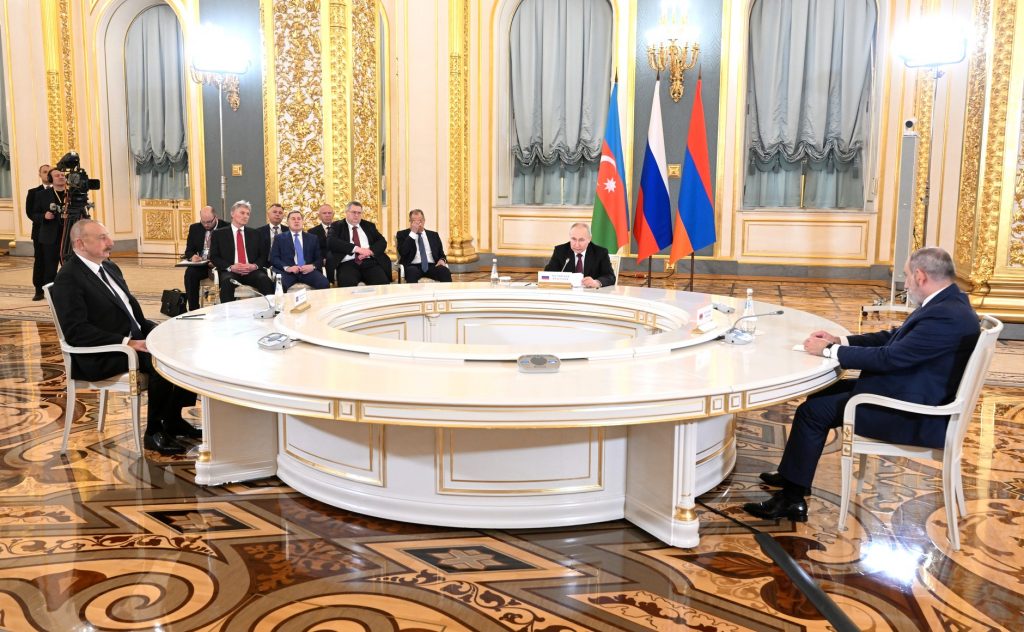
On Thursday, May 25, a trilateral meeting occurred between Vladimir Putin, Ilham Aliyev and Nikol Pashinyan. This meeting was preceded by separate talks between Vladimir Putin and the President of Azerbaijan, and the Prime Minister of Armenia, which took place the day before. Also, on the eve of the trilateral meeting, during the Supreme Economic Council of the EAEU meeting, there was a verbal skirmish between the leaders of Azerbaijan and Armenia due to inaccuracies in the use of previously defined terminology.
The trilateral meeting itself was held behind closed doors. Publicly, the Russian president only emphasised the significant progress in the negotiation process to resolve disputes between Baku and Yerevan and also suggested that a meeting be held in a week at the level of the vice prime ministers of the three countries to eliminate inaccuracies in terminology.
Outcomes and outlook:
Russia, previously lost its monopoly on peacekeeping operations in the Caucasus and ceded the palm in this process to the United States, is now actively catching up. Now, when the conflict between Armenia and Azerbaijan is close to a final resolution, Putin is trying to appear in the final as the man who managed to end more than thirty years of war. Obviously, in exchange for giving up Nagorno-Karabakh/Artsakh, Nikol Pashinyan will receive some economic preferences from Russia – this is very important for a resource-poor country (apparently, Putin’s complementary statements about the Armenian economy, which were made during the meeting of the Economic Council of the EAEU were announced for a reason).
It may be the “Karabakh model” (territorial concessions in exchange for economic preferences) that can be offered to Russia and Ukraine soon as the basis of a “peace treaty”.
At the same time, the presence of many “inaccuracies” demonstrate that the solution to the Armenian-Azerbaijani conflict is still far away, and such meetings are only an attempt to advance this issue and not the finalisation of peace agreements.
- Telephone conversation between Vladimir Putin and Brazilian President Luiz Inacio Lula da Silva
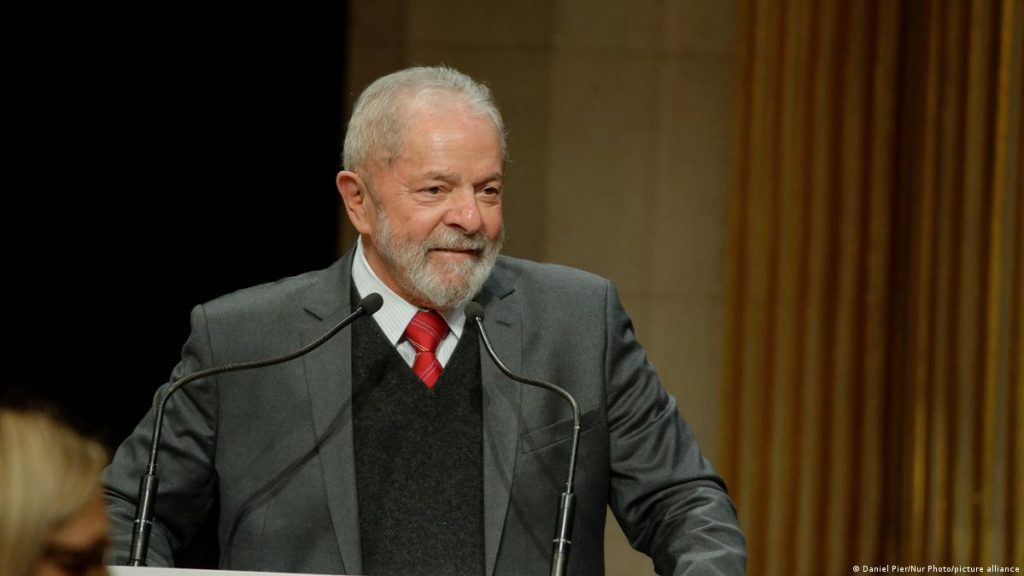
On Friday, May 26, a telephone conversation took place between the presidents of Russia and Brazil. According to official information, during the conversation, the President of Brazil summed up the results of participation in the G7 summit and raised the issue of possible mediation efforts to resolve the Ukraine conflict. In turn, Putin voiced his assessments of the development of the situation around Ukraine while confirming the openness of the Russian side to dialogue in the political and diplomatic direction.
Outcomes and outlook:
Brazil’s new president, Lula da Silva, has repeatedly shown a penchant for building closer alliances with China and Russia. Brazil’s peaceful initiatives on the Russian-Ukrainian conflict are essential to Chinese initiatives and are more beneficial to Russia than to Ukraine. Lula da Silva strongly supports Putin’s ideas regarding the de-dollarisation of interstate relations. He is generally one of the key elements in promoting the “global South” interests to the American continent. It can be predicted that phone calls and meetings between Lula da Silva and Putin will become common and regular.
Notably, Lula da Silva became the only president at the G7 summit who did not meet with Vladimir Zelensky. At the same time, both sides made opposite statements, demonstrating the lack of consensus in positions. Nevertheless, it is not excluded that such a step was taken on purpose by the Brazilian president to more clearly show his work and raise rates in the Latin American region and relations with Washington.
- Dmitry Medvedev’s visit to Vietnam
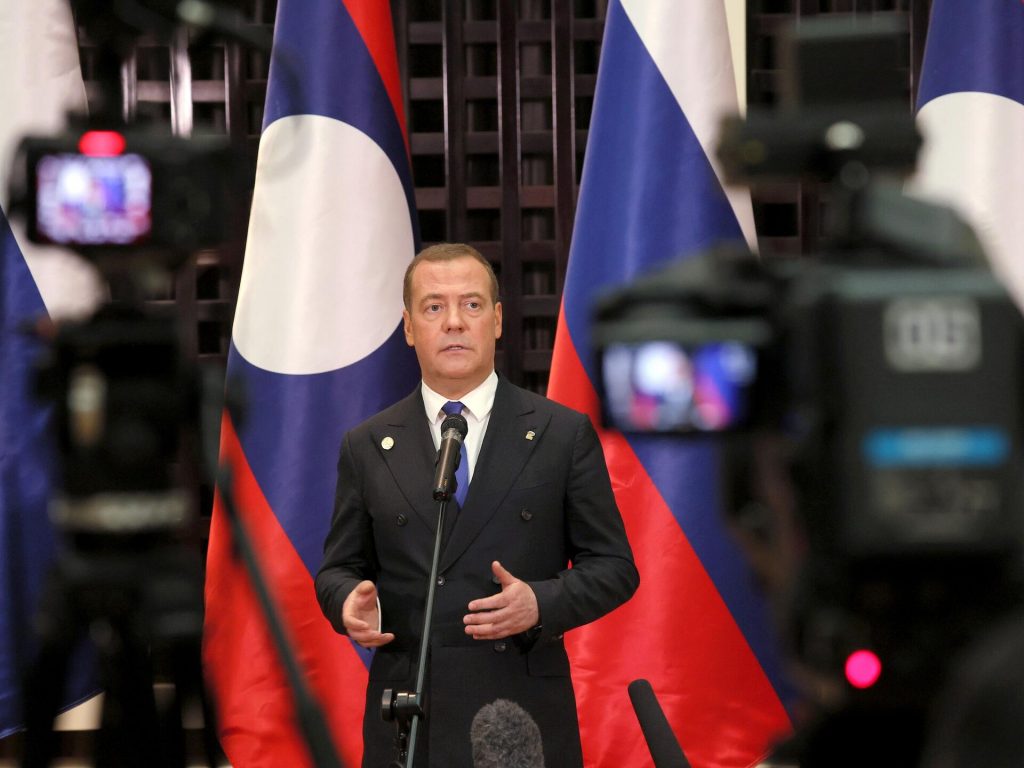
On Monday, May 22, Dmitry Medvedev, Deputy Chairman of the Security Council of Russia, began his working visit to Vietnam, where he held talks with the country’s leadership. In particular, Medvedev met with the General Secretary of the Central Committee of the Communist Party of Vietnam (CPV), Nguyen Phu Trong and the Permanent Secretary of the CPV Central Committee, Truong Thi Mai. Also, during the visit, Medvedev laid wreaths at the monument to the fallen heroes and the Ho Chi Minh mausoleum in Hanoi.
Medvedev’s key statements:
- “The world is never calm; difficulties and problems always exist. However, we appreciate what always exists between us – benevolent and friendly relations. Regardless of what is happening on the planet, we help each other. You can rest assured that this will continue to be the case.”
- “Everything being done to strengthen our ties will serve our peoples well,” Medvedev said. “And in this work, we will rely on those people who love Russia, who know the Russian language, history and culture. This is of great importance to us. This is a precious resource of our friendship.”
- “It so happened that I first visited Vietnam in 2000, now it’s 2023, and it’s a different Vietnam. So I congratulate you on this.”
He has also made a few statements regarding Ukraine:
- “This conflict will take a lot of time. I guess, it will take decades. This is a new reality, new conditions of life. As long as there is such power, there will be three years of truce, two years of conflict, and everything will happen again.”
- “If Kyiv is handed over nuclear weapons, this will mean that missiles with a nuclear charge will arrive. There are irreversible laws of war. So if it comes to nuclear weapons, it will be necessary to launch a preemptive strike.”
- According to Medvedev, there are three options for ending the war:
- according to the first, the west of Ukraine comes under the control of the EU, and the “remaining” part of Ukraine, not controlled by Russia, continues to claim the return of the territories occupied by Moscow. Ukraine is joining NATO and the EU in the medium term.
- According to the second option, Ukraine will be divided entirely between the Russian Federation and the EU countries, and “the conflict is terminated with reasonable guarantees of its non-resumption soon.”
- according to the third option, the west of Ukraine joins the EU countries, and the rest of the regions to Russia. After that, “the conflict ends with sufficient guarantees of its non-recurrence in the long term.”
- Medvedev claims that “there are simply no other options.” And that the Russian Federation “may temporarily arrange the second option, but a third is needed.”
Outcomes and outlook:
Medvedev continues to play the role allotted to him – he scares with nuclear weapons and the escalation of the regional conflict around Ukraine into a global one. In this regard, he (along with Yevgeny Prigozhin) is one of the contenders for the “new Zhirinovsky” role. As a platform for voicing certain theses, Vietnam was not chosen by chance. This state is not only a partner of Russia in many (primarily energy) issues but is also a symbol of the most famous military defeat of the United States. Thus, Medvedev decided to make both a hidden, symbolic message to Washington and demonstrate the possibilities for Russia to circumvent the sanctions imposed by the West by intensifying relations with third countries.
At the same time, Vietnam bears severe risks for Russia’s foreign policy. Due to strained relations with China, he is one of the world’s largest arms buyers. Vietnam is also one of the largest buyers of Russian weapons, according to the Stockholm International Peace Research Institute (SIPRI), which tracks global military spending.
Medvedev’s visit itself was aimed at normalising relations between Russia and Vietnam. On the eve of the visit, Medvedev said that Russian companies were ready to resume wheat supplies and increase meat exports to Vietnam, which could become essential in ensuring the country’s food security. It should be noted that Vietnam is the largest foreign buyer of Russian pork (almost 50% of its exports).
The issue of resuming direct regular air traffic between Russia and Vietnam was no less critical, which should happen as early as early June. In fact, in this way, Russia is increasingly getting rid of global isolation. Moreover, with the beginning of the summer season, Russian citizens have new recreational destinations, which is vital in terms of public sentiment on the eve of the presidential elections.
At the same time, Vietnam remains one of the few UN members that has not supported a single UN resolution on Ukraine condemning Russia. Meanwhile, the day before the meeting with Dmitry Medvedev, Vietnamese Prime Minister Pham Minh Tinh, invited to the G7 summit in Hiroshima, met with President of Ukraine Volodymyr Zelensky on the forum’s sidelines. As the Vietnamese portal VnExpress reported, speaking about the situation in Ukraine, the prime minister confirmed that “Vietnam’s consistent position is that all disputes should be resolved peacefully.” According to him, Vietnam hopes that the parties to the conflict will soon resume dialogue.
The struggle for Vietnam is intensifying in the geopolitical arena, which gets the opportunity to decide on a different foreign policy vector and get as many preferences as possible from its position.
- Mikhail Mishustin’s visit to China
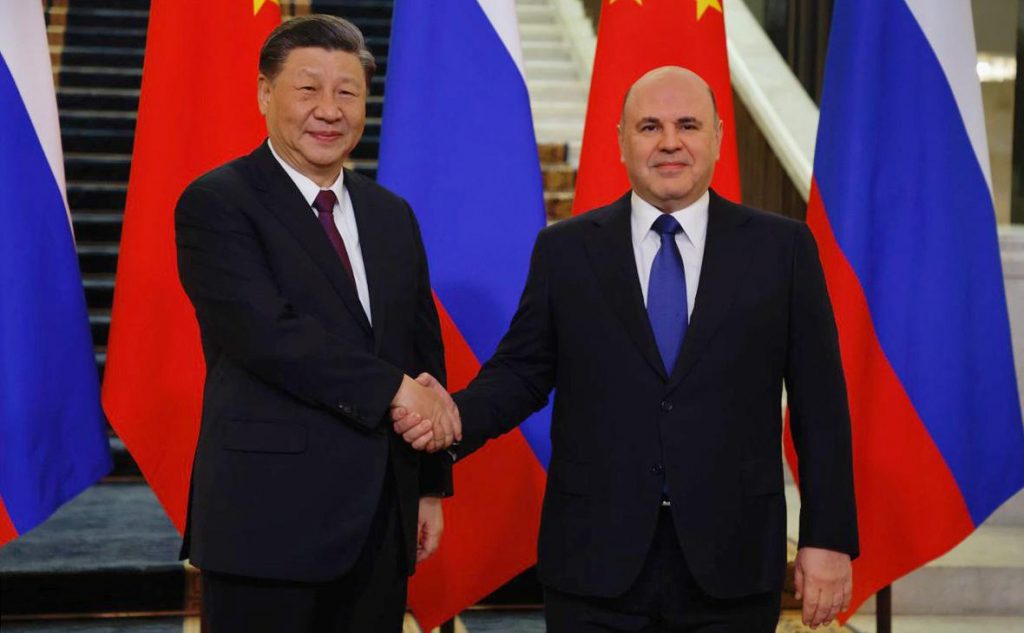
On Tuesday, May 23, Russian Prime Minister Mikhail Mishustin, at the head of the Russian delegation, arrived on a working visit to China. He spoke at the plenary session of the Russian-Chinese Business Forum in Shanghai, held Russian-Chinese talks with the Premier of the State Council of the People’s Republic of China, Li Qiang, laid a wreath at the Monument of People’s Heroes in Beijing, visited Tsinghua University, met with President of the People’s Republic of China Xi Jinping, visited the Shanghai Research Institute of Petrochemistry of the Chinese National Petrochemical Corporation Sinopec, and also held a meeting with the President of the BRICS New Development Bank Dilma Rousseff.
Key theses:
Speech at the Russian-Chinese Business Forum in Shanghai:
- “Last year, Russia was subjected to unprecedented sanctions pressure. His goal was to break our economy, collapse the national currency, and provoke devastating inflation. To hit the standard of living of ordinary citizens. None of what our ill-wishers dreamed of happened. We have not only survived, but we continue our progressive development.”
- “Regarding several economic parameters, we have not only not slumped but have grown significantly. Thus, last year they reached a new historical maximum in grain harvest – 157 million tons, significantly surpassing even the achievements of the Soviet Union. As a result, now Russia is abundantly providing domestic demand for grain, sugar, vegetable oil, meat, and fish.”
- “Russia cherishes the centuries-old history of relations with China. For two years in a row, the volume of mutual trade has increased by about a third. In 2022, a new record was set – about $190 billion. I am confident that this year we will fulfil the task set by the heads of our states, Vladimir Vladimirovich Putin and Xi Jinping, to bring mutual trade to $200 billion.”
- “We are interested in further developing the international corridor “Russia” in the east direction with exits to the PRC, including through Kazakhstan and Mongolia, which is necessary to ensure seamless logistics from St. Petersburg to Vladivostok and increase trade.”
Russian-Chinese negotiations:
- “Today, relations between Russia and China are unprecedentedly high. Mutual respect’s interests characterise them, the desire to jointly respond to new challenges associated with increased international turbulence and the pressure of illegal sanctions from the collective West. As our Chinese friends say: “Unity makes it possible to move mountains.”
- “Partnership in the energy sector has acquired a strategic character. Russia ranks first in oil supplies to China, and natural gas, coal, and electricity exports are growing. In addition, major energy projects are being implemented with the participation of Chinese companies. These are the Power of Siberia, Yamal LNG, Arctic LNG 2, the Amur Gas Chemical Plant, and the processing complex in Ust-Luga. We are also actively expanding our cooperation in the field of peaceful atom.”
Meeting with Chinese President Xi Jinping:
- “Dear Mr Xi Jinping, first of all, let me convey the best wishes from the President of Russia, Vladimir Vladimirovich Putin. He recalls with great warmth the talks with you in Moscow in March. Your state visit to the Russian Federation has opened a new path in developing comprehensive strategic cooperation that links Russia and China.”
- “We sincerely value the good neighbourliness, partnership and cooperation that bind Russia and China. For us, this is particularly important in the context of increased turbulence in international markets, the international arena as a whole.”
- “Our countries stand together against the attempts of the collective West to maintain global dominance, to use illegal sanctions to impose its will on independent states. I am convinced that Russia and China will rebuff these dangerous aspirations and create favourable conditions for confident progress towards our common strategic goals.”
- “There are positive achievements in investment cooperation. We are working on 79 joint projects totalling over $165 billion today. However, we propose not to rest on our laurels but to actively open up promising areas of cooperation. This is how we will ensure a new quality of Russian-Chinese relations by 2030.”
Outcomes and outlook:
Mikhail Mishustin’s visit to Beijing aims to implement the previously reached political agreements between Vladimir Putin and Xi Jinping. Mishustin, as head of government, is responsible for the economic block of relations with China. This visit manifests the further rapprochement between the two countries, and the extrapolation of political processes to the economic environment. There were no surprises: In the near future, we can predict closer cooperation between Russia and China and the solution to Russia’s financial problems at the expense of China and its satellites.
Mishustin’s main message, voiced during his visit to China, is “Our economy has survived, but now it needs your support.” He was heard. At the same time, one should not expect any drastic changes regarding sanctions or positions on the Ukrainian issue. On the contrary, Beijing will maintain its “neutrality” by acting as an intermediary and promoting its peace plan, according to which the war should end “without losers.”
It is worth reacting very carefully to rumours that China is considering Mishustin as the next president of the Russian Federation. Such information is actively disseminated in Putin’s inner circle to promote the idea of the need for personnel changes. In particular, the conditional group of Sergei Chemezov has been lobbying for a long time for the appointment of Deputy Prime Minister – Minister of Industry and Trade of the Russian Federation Denis Manturov (who is Chemezov’s creature) to the post of Prime Minister, criticising Mishustin for being too liberal.
At the same time, Mishustin’s visit to China gives him short-term guarantees to maintain his position. Therefore, most likely, this issue will not be raised this year.
- Appointment of Maxim Travnikov
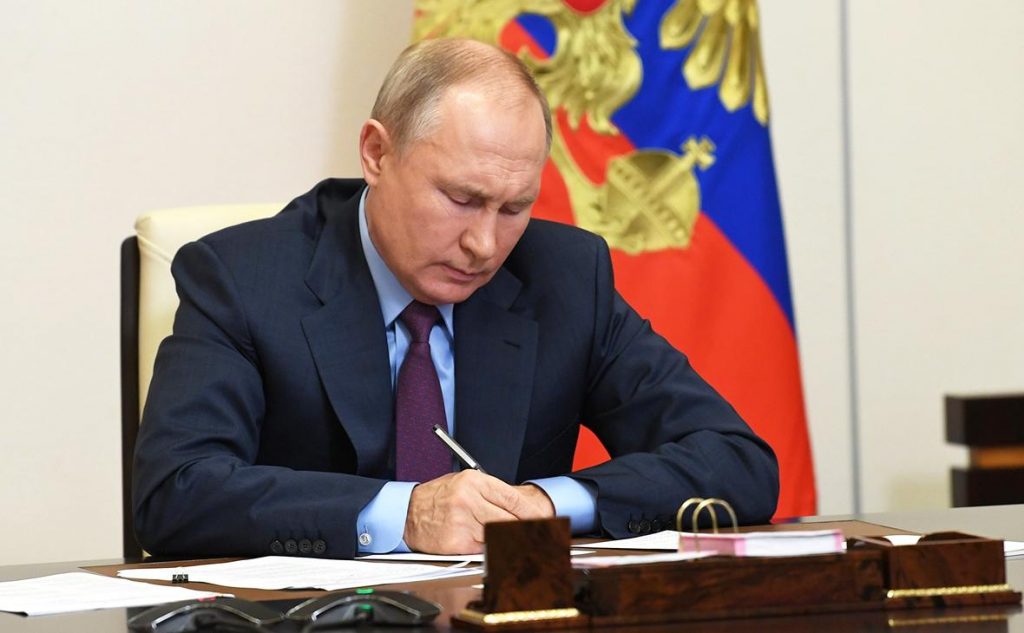
On Tuesday, May 23, Vladimir Putin signed a decree appointing Maxim Travnikov as head of the Presidential Administration for Civil Service, Personnel and Anti-Corruption. Previously, he served as head of the Russian Presidential Department for Public Service and Human Resources. As a result, the former leader, Andrei Chobotov, was relieved of his post.
Outcomes and outlook:
Maxim Travnikov previously worked in the Presidential Administration, heading the Office of the President for Civil Service and Personnel. Now there has been a merger of the two departments – Travnikov also headed the department for combating corruption. Thus, the actual control over the Office of the President of the Russian Federation on Combating Corruption is transferred from the ex-head of the Presidential Administration and ex-Minister of Defense, the closest associate of the head of state, Sergei Ivanov, to another closest associate of the President, the current deputy head of the Presidential Administration Dmitry Kozak. According to available information, such a transition occurs against Ivanov’s gradual retirement from the business.
Being a direct creature of Kozak, Travnikov significantly strengthens the apparatus positions of “DNA” (as Kozak is called in political circles). At the same time, the Administration decided not to separate the processes of personnel policy and combating corruption, linking them into a single process, which obviously makes sense.
In this situation, it is worth noting that Dmitry Kozak is gradually regaining his influence on decision-making regarding the temporarily occupied territories of Ukraine. In particular, his creature will now supervise, among other things, critical appointments in the law enforcement and judicial bloc, which leads to direct parallels with an attempt to appoint a judiciary in the self-proclaimed LDNR and the temporarily occupied parts of the Kherson and Zaporizhzhia regions of Ukraine.
- Deployment of Russian nuclear weapons in Belarus
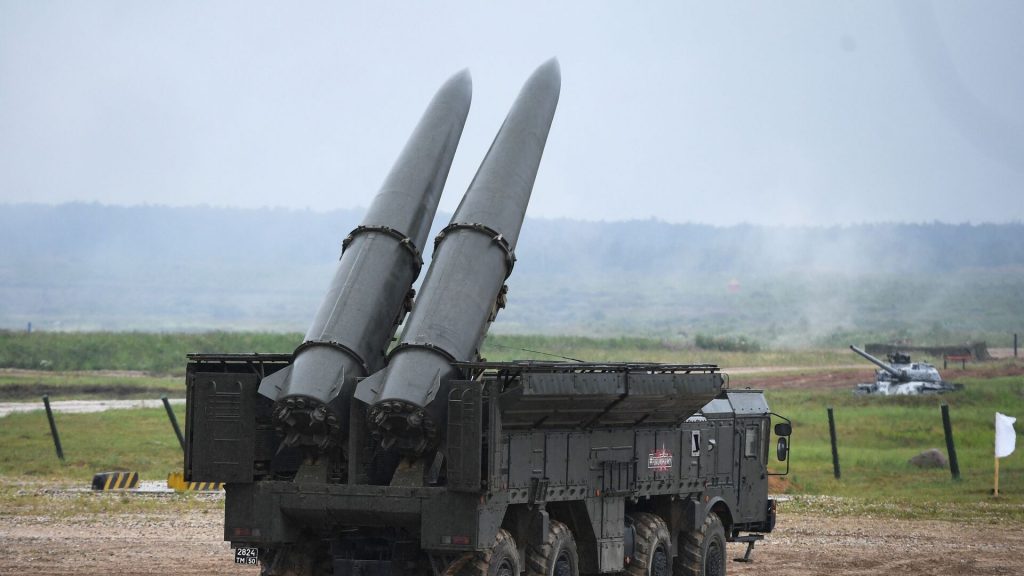
On Thursday, May 25, Russian Defense Minister Sergei Shoigu said that Belarus had signed documents on the procedure for keeping Russian tactical nuclear weapons there. He also recalled that Russia does not transfer nuclear weapons to Minsk but only places them on the territory of Belarus under its control. Shoigu also said that the Iskander-M OTRK capable of using nuclear missiles was handed over to the Belarusian side, and some of the Belarusian aircraft were converted for the possible use of nuclear weapons.
Key theses:
- On the sidelines of the Supreme Eurasian Economic Forum in Moscow, Lukashenko commented: “A decision has already been made to develop what was said orally. We had to prepare places, storage and so on. We all did it, so … the movement of nuclear weapons began.
- In response to a clarifying question, Lukashenko said that Russia’s nuclear weapons are already in Belarus: “It’s possible. I’ll come and see.”
- “Vladimir [Putin] tells me that a decision has been made to deploy tactical nuclear weapons in Belarus, he told me about it. I say thank you!
- “If someone is worried, I don’t think Kasim Tokayev is worried about this. But if suddenly, no one has anything against Kazakhstan and other countries having the same close relations as we have with the Russian Federation. And this is very simple: you must ally with Russia and Belarus. All! And there will be nuclear weapons for everyone. But, strategically, we must understand that we have a unique chance to unite.”
Outcomes and outlook:
The deployment of nuclear weapons on the territory of Belarus is a mirror step of the Russian Federation in response to NATO expansion and the creation of military bases on the territory of the former socialist camp. Russia has decided to raise the stakes while simultaneously seeking to resume negotiations with NATO and the United States. At the same time, Russia makes it clear to Poland and Lithuania that the idea of holding a coup in Belarus will be met with all severity: it is one thing when Belarus was just a state friendly to Russia and another when Russian nuclear weapons are located on the territory of Belarus. Naturally, deploying nuclear warheads on the country’s territory does not make Belarus a nuclear state. But definitely – it makes it a target for nuclear attacks in the event of a global nuclear war.
In this case, the protection of Belarus from possible conflicts with its Western neighbours can be viewed as strengthening the interaction between Moscow and Beijing and strengthening Beijing’s influence on Belarus. Furthermore, Lukashenko’s recent statements about plans to develop the production of microchips and other high-tech electronics demonstrate the desire to turn Belarus into a zone of stability and develop it as a negotiating platform between the global West and the global East.
- Interview with Yevgeny Prigozhin
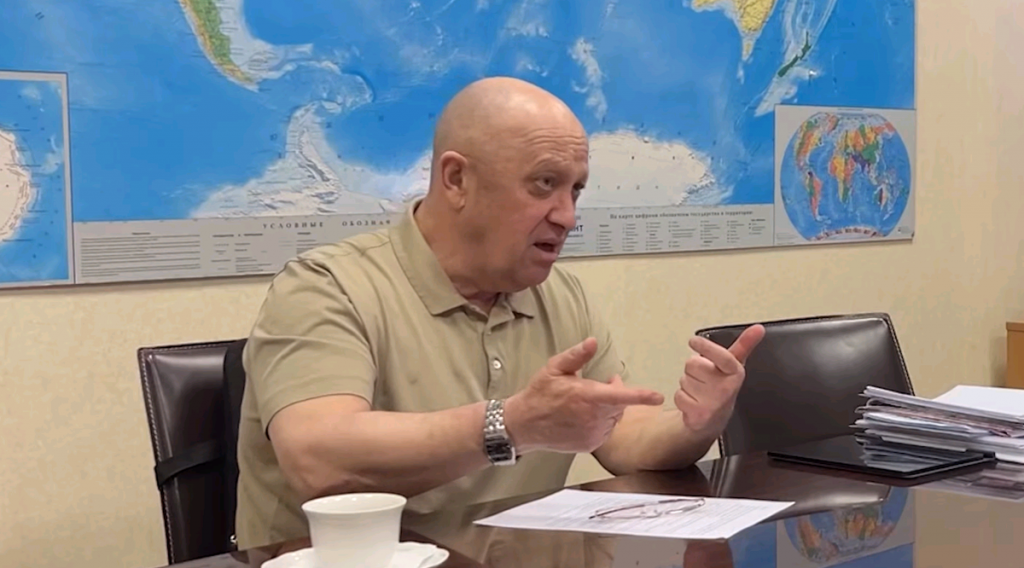
On Wednesday, May 24, an interview was published by the curator of Wagner PMC, Yevgeny Prigozhin, with journalist Konstantin Dolgov. The interview was published in the Telegram channel “Speaks Dolgov 18+”. In it, Prigozhin spoke about the losses in the units of the Wagner PMC in the battles for Bakhmut and once again criticised the military leadership of the Russian Federation.
Key theses:
- According to Prigozhin, 10,000 prisoners (out of 50,000 recruited to PMCs) and 10,000 full-time Wagner soldiers died in the battles for Bakhmut. The losses of the Armed Forces of Ukraine, according to his version, are 50 thousand people killed.
- “We drew clear administrative boundaries of the city and completely, down to a square centimetre, meticulously went through and cleaned out the entire city, be it gardens, some kind of free territory, high-rise buildings. And so the Wagner PMC fulfilled its task of taking Artemovsk [Bakhmut].”
- “I can say this from my own experience – we fought in many places and with many people – today, the Ukrainians are one of the strongest armies. They have a high level of organisation, a high level of training, a high level of intelligence.”
- Criticising the military leadership, Prigozhin said Sergei Surovikin should be appointed Minister of Defense and Mikhail Mizintsev Chief of the General Staff.
- “Today, PMC Wagner is the best army in the world. Behind it, of course, out of correctness, I must say that this is the Russian army, but I think the Ukrainians are stronger.”
- “SMO” was done for the sake of denazification… And we have made Ukraine a nation that is known throughout the world. They are like Greeks or Romans in their prime. Now concerning demilitarisation. If at the beginning of the special operation, they had conditionally 500 tanks, now they have five thousand of them. If then 20 thousand fighters skillfully fought, then now 400 thousand. How did we demilitarise it?”, – said the curator of “Wagner”.
- Prigozhin defines two scenarios for the development of further events: “Optimistic” (Prigozhin does not believe in him) – “Europe and the United States will get tired of supporting Ukraine, negotiations will be held with the mediation of China, and Russia will leave behind the occupied territories.” “Pessimistic” – “The Armed Forces of Ukraine will receive missiles and equipment in the West and will continue to fight for the restoration of borders until 2014.”
- To avoid defeat, Prigozhin calls for “stop building glass towers and fattening” and transfer all production to military needs, announce additional waves of mobilisation and fight on.
- He stated that if the regular army of the Russian Federation fails to control and keep Bakhmut, this will discredit the RF Armed Forces and make Wagner PMCs more combat-ready than regular troops. Moreover, during the surrender of Bakhmut, Prigozhin hinted at a “revolution”.
Outcomes and outlook:
Prigozhin is gradually getting used to the role of a politician who acts as the Russian “party of war” leader. He actively criticises the system and established institutions, gives political forecasts, and acts as a “people’s politician”. After the death of Zhirinovsky, Russians lacked such politicians. So Prigozhin decided to fill the vacuum in this political niche.
Our forecast regarding Prigozhin’s presidential nomination and creating a political simulacrum that can favourably set off Putin in the 2024 presidential election remains valid. Prigozhin is an artificially created political product whose influence on the media is conveniently regulated. For example, when his ratings became too high, he was ordered to stop mentioning Prigozhin and PMC Wagner in the Russian media. The ban will not last too long.
Despite his increasingly harsh statements, Prigozhin poses no real threat to the ruling regime. Instead, his main goal is to demonstrate to Western audiences that his political ambitions are real and not consolidated with the Kremlin. Apparently, in this context, we should expect a number of no less spectacular attacks against the Russian authorities.
- Visit of China’s Special Representative for Eurasian Affairs in Moscow
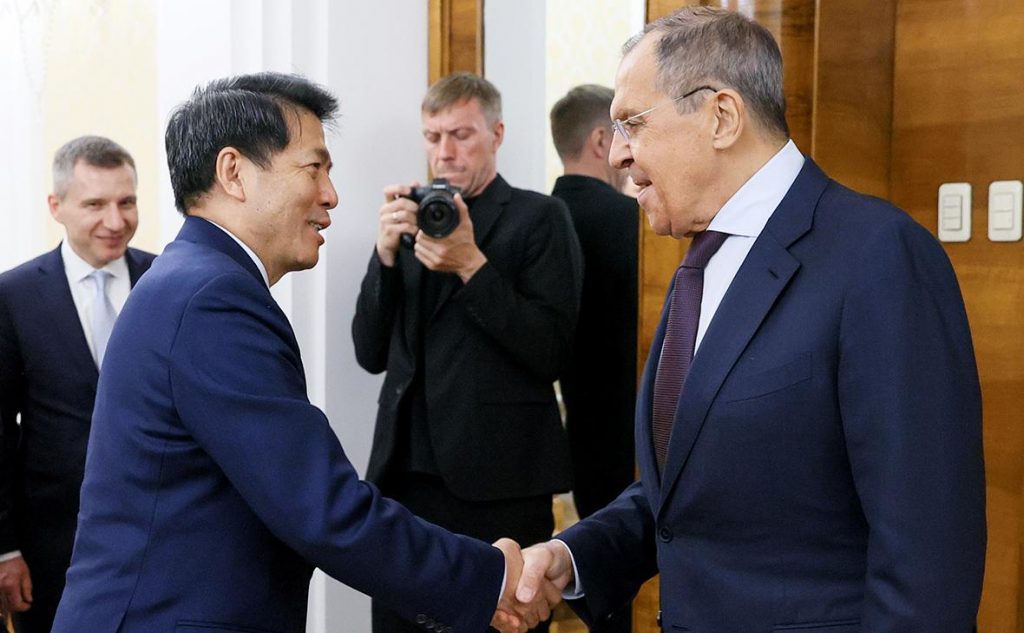
On Friday, May 26, Li Hui, a Special Representative of the Chinese Government for the Eurasian Region, visited Moscow, where he met with Russian Foreign Minister Sergey Lavrov. According to official information, during the meeting, both sides expressed readiness to strengthen Russian-Chinese foreign policy cooperation further, invariably aimed at maintaining peace and stability in the region and the planet. Also, Lavrov said gratitude to the Chinese side for a balanced position towards Ukraine and highly appreciated Beijing’s readiness to play a positive role in its settlement.
Timeline:
- Ahead of Li Hui’s visit to Moscow, the Wall Street Journal published an article stating that the Chinese representative who handles the Ukrainian settlement during a trip to Europe called for an immediate ceasefire in Ukraine with Russia retaining its new regions.
- Later, the Russian edition of RIA Novosti published an article in which an unnamed source in the Russian Foreign Ministry warned the Wall Street Journal of the consequences of continuing disinformation about Russia: “If the Wall Street Journal continues to engage in activities not related to journalism, publishing disinformation regarding Russia, this will mean that the editors are not at all interested in the fate of Gershkovich.
- Adviser to the Head of the Office of the President Mikhail Podolyak called all “compromise scenarios” for ending the war in Ukraine “Russian”:
- “Any “compromise scenario”, which provides for the liberation of not all the territories of Ukraine, which “anonymous sources” in European and American elites periodically talk about, is tantamount to admitting the defeat of democracy, the victory of Russia, the preservation of the Putin regime and, as a result, a sharp increase in conflicts in the world politics. All this is Russia’s cherished dream. The question is rhetorical: Why do individual public figures continue to play out the “scenario of the Russian media” and drag out the conflict?
- Sometime later, Deputy Foreign Minister of the Russian Federation, Mikhail Galuzin, announced Russian conditions for the end of the war in Ukraine: “We are convinced that a settlement is possible only if the hostilities of the Armed Forces of Ukraine and the supply of Western weapons. Furthermore, to achieve a comprehensive, just and lasting peace, Ukraine must return to a neutral non-aligned status, fixed in the 1990 declaration of state sovereignty, and refuse to join NATO and the EU.”
Outcomes and outlook:
China further intends to promote the issue of a peaceful settlement of the Russian-Ukrainian conflict through the prism of its interests. To date, Brazil has supported the Chinese line and several African states. According to Li Hui’s mission results, adjustments will be made to the plan itself. However, it is also evident that all possible issues of a peaceful conflict settlement will be resolved primarily at the level of Beijing-Washington, then Washington-Moscow, and only then will decisions be made that Ukraine will be forced to take for granted. Unfortunately, even a bloody war did not add subjectivity to Ukraine in international politics.
In the context of Li Hui’s visit to Moscow and negotiations with Sergey Lavrov, the publication of material in the Wall Street Journal looks like an outright provocation to prevent the strengthening of the negotiation process on China’s terms. In this context, the harsh response of the Russian side is very revealing.
- Vladimir Kolokoltsev’s visit to Saudi Arabia
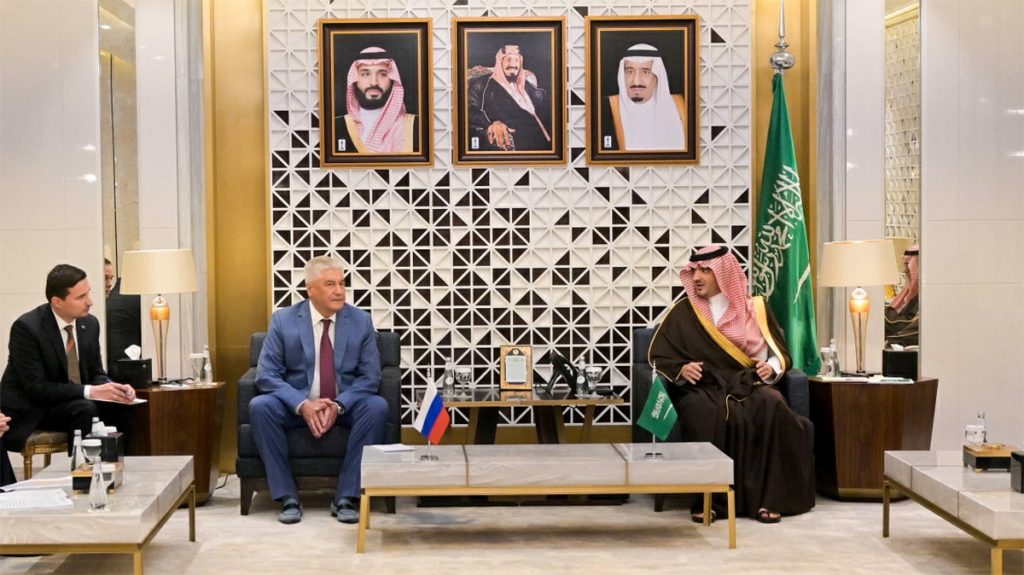
On Wednesday, May 24, Russian Interior Minister Vladimir Kolokoltsev paid a working visit to Saudi Arabia, where he met with Saudi Interior Minister Abdelaziz bin Saud bin Naef Al Saud and visited many departments of the Kingdom’s Interior Ministry. Following the visit, Kolokoltsev made several statements.
Key theses:
- “Either in the Russian Federation or in the Kingdom, they do not accept attempts from outside to bring some specific Western values to our countries. They may… soon marry animals, but that doesn’t mean we must follow their principles. There, probably, someone is already grunting in anticipation. Nevertheless, both the Saudis and the Russians have an absolute position of preserving our traditional values.”
- “We have determined our ways of further cooperation and determined that cooperation will expand and deepen in the name of security and stability in our countries.”
- “Certainly, the international situation and all geopolitical events affect all the events of international police cooperation. Well, what is gratifying is that the Kingdom of Saudi Arabia did not succumb to outside pressure, did not join the Ukrainian coalition, and continues to pursue its independent, sovereign policy. And, in particular, with the Russian Federation.”
Outcomes and outlook:
The interior minister’s visit is more of a working and symbolic nature, which should show the deepening of relations between Russia and Saudi Arabia. The main interest in relations between the two countries has been based on the energy component. After that, Geopolitics were added to them. Kolokoltsev’s visit is intended to show that relations between Moscow and Riyadh are not limited to these essential topics but tend to expand to all areas of possible interaction.

